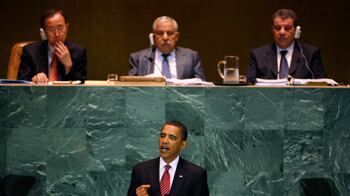
Obama’s U.N. speech was fine, but words won’t solve much. Leslie H. Gelb’s advice to the president: Go slow on Afghanistan, do community organizing in the Mideast—and don’t snub the dictators.
To solid applause at the U.N. General Assembly, President Obama called on the world’s leaders to join the United States in “a new era of engagement based on mutual interest and mutual respect." To more applause, he said his country would “re-engage” with the United Nations. To less applause, he added that “the world cannot now stand by and wait for America to solve [its] problems alone.”
Click Image To View Our Gallery of Memorable U.N. Moments
For all the high-sounding rhetoric, this is an awful week. When the United Nations General Assembly comes together, you have all the would-be peacemakers and villains of the world gathered together in one place. And it becomes plain to see how hard it is to get anything done. In the Middle East, there’s stalemate again, or stalemate still. In Afghanistan, we’re on the verge of making some impossibly hard decisions. And then you’ve got Libya and Iran —with Muammar Qaddafi and President Ahmadinejad walking around talking their nonsense. All the monsters and mayhem of the world have arrived on our doorstep. And when these leaders from renegade states talk--and they will be talking--you’ll see how far apart they are from the rest of the world.
• The Daily Beast’s Geoffrey Robertson: Qaddafi Was a New Low for the U.N. • Watch: A History of U.N. Outbursts President Obama and Secretary of State Clinton are going to dozens of meetings with heads of state and foreign ministers. It’s going to be hard to get any real business done, because the meetings are relatively short and the problems are deeply rooted and impossibly long-range. As they go about their various get-togethers, one enormous weight bears down on them, one that outweighs all others at the moment: what to do about Afghanistan.
The pressure on that front shot way up this week when Gen. Stanley McChrystal’s assessment of the situation and his likely recommendations were leaked. The White House is in a tizzy about who leaked the report, but they won’t find out. Chances are it was leaked by our military—because they saw the White House was wavering on its commitment toward Afghanistan, and they were trying to stiffen the president’s spine. But if the military did leak the report, the plan backfired; the leak precipitated instead an all-out review of policy.
And that’s how it should be. Obama responded appropriately—by slowing down the machinery. Everybody is in a different place—Joe Biden, the military, the Republicans and the American public; there is, at the moment, no good way to bring everybody together. He’s got to slow things down, and he’s right to do that until he gets his bearings again—as long as he realizes he can’t keep changing his bearings.
Timing is the key factor here, and it is timing that makes the situation so difficult. Obama needs time to bring Democrats and Republicans together on a common strategy. Timing divides us, and timing gives us a chance to unite.
Do the Al Qaeda threats in the headlines change the equation? Not really. We’ve heard these threats for eight years now. And we know Al Qaeda can do harm to the United States and its allies—not just from Afghanistan, but from Pakistan, London, Madrid, Jersey City and now Colorado. Afghanistan is not the only place we have to worry about where Al Qaeda is concerned. They can attack us from virtually anywhere; all they need is a working cell, a laptop and some explosives. They don’t need Osama bin Laden Central to accomplish this.
If Qaddafi or Ahmadinejad comes too close, bend down to tie your shoes. A picture of you shaking hands with either leader will swamp everything important that’s happening in the world.
Vice President Biden is right in his central thrust—Afghanistan is not of vital national security interest to the United States. But how then do we disentangle from this place in a responsible way?
We’ve got to get enough Democrats who understand that we can’t just walk away from Afghanistan. We need to give a year or two to train and arm friendly Afghan forces to hold off the Taliban and Al Qaeda. We need to prepare them seriously to do this, and we haven’t done that. There’s no serious program to train their police and their military. When our military takes over, they do it all. We have to start training Afghans to do it themselves. It’s got to be their war, not our war; otherwise it never works, and we always end up losing.
For their part, the Republicans need to understand that this country—and we are a democracy, after all—is not going to support keeping troops in Afghanistan forever, and probably not for much more than two years. If Republicans thought Afghanistan was central to our national security, why didn’t they send proper resources during George Bush’s eight-year presidency? And they can’t or shouldn’t let Obama fail, because that means America fails.
Another trouble spot that comes to the fore this week is the Middle East. The headlines suggest we’re back to Square One, but in reality we never left it. People like to think we’re on the verge of a new and serious round of negotiations. But that’s chimerical. Such negotiations can’t happen as long as there is little support in either the Israeli or Palestinian communities for compromise. At the moment, both communities are radicalized.
So what to do? The Obama administration can’t just put the Middle East on the back burner, and pretend it’s not there, the way George Bush did. There’s got to be some formal process underway—but the administration has to make sure that formal process is not the top priority. George Mitchell, the administration’s Mideast envoy, ought to know this better than anybody.
He ought to remember what worked in Northern Ireland, where his patient diplomacy, in a previous envoy position, worked well. There, the British kept pushing Catholics and Protestants to the table, and the talks kept failing. After ten years, they started concentrating on building support in Catholic and Protestant communities for compromise—and took the spotlight off the negotiating table. They started working with women’s groups on both sides, who began pushing for peace. They worked with the business communities, too, on joint business ventures. That created the grassroots political support in Northern Ireland that eventually led to compromise at the negotiating table. We have to do the same thing with the Israelis and the Palestinians: step back, and foster some projects that will establish the support needed for their leaders to compromise and reach a deal.
The Netanyahu government isn’t helping at the moment. They’ve been going around saying that the Obama administration is not particularly friendly towards Israel. They’re wrong, and what they’ve said has been quite nasty—alleging that people like Rahm Emanuel and David Axelrod are self-hating Jews. They are not. They are supporters of Israel, and they favor serious negotiations. That doesn’t make them self-hating. That makes them practical. And the kind of name-calling we’re seeing will only cost Israel support in the United States.
Obama faces another, extremely thorny challenge: How to dance with the dictators in town this week without getting burned. Obama needs to be especially wary about handshakes and photo ops. My advice: keep your hands in your pockets, and if Qaddafi or Ahmadinejad comes too close, bend down to tie your shoes. A picture of you shaking hands with either leader will swamp everything important that’s happening in the world.
And resist the pressure to publicly snub them. John Foster Dulles, President Eisenhower’s secretary of state during the Geneva talks on Indochina in 1954, refused to shake hands with China’s Zhou Enlai to protest Beijing’s support for North Vietnam and North Korea. Zhou Enlai never forgot, and never forgave the insult. People are built that way.
George Bush’s major accomplishment in foreign affairs was the deal he made with Qaddafi. He got Libya to eliminate its weapons of mass destruction and stop supporting terrorism. It was a great deal. We let Qaddafi back into the world community; Bush even supported making him a member of the UN Security Council. We may not like what he’s doing and what he is saying, but we’re working with him in a practical way to solve common problems. We don’t want to undermine that with public insults.
The same is true for Ahmadinejad. We’re about to start negotiating with Iran on Oct. 1. What’s better: trying to negotiate some controls on the uranium enrichment program, or bombing them? And what Iranian retaliation would follow a bombing? There are a whole bunch of people who would love to see Obama thumb his nose at Iran’s leader. That’s the way to make the mutual problems more intractable. Even the Iranians that we’d like to see eventually succeed don’t want us to insult their leaders. It’s better to avoid the dictators than insult them.
Leslie H. Gelb, a former New York Times columnist and senior government official, is author of Power Rules: How Common Sense Can Rescue American Foreign Policy (HarperCollins 2009), a book that shows how to think about and use power in the 21st century. He is president emeritus of the Council on Foreign Relations.






